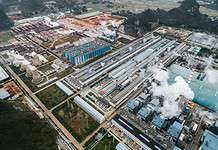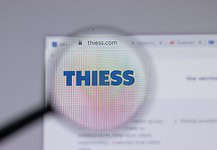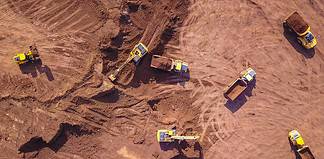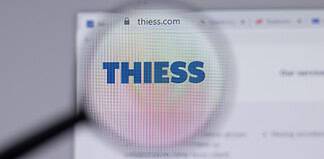ONE of WA’s first female geologists, Dr Erica Smyth, was named the winner of the Business category for this year’s WA Australian of the Year Awards, which honour outstanding Western Australians who have made a positive impact on the lives of others. Dr Smyth – who was made a Companion of the Order of Australia last year – is renowned for her contribution to WA’s resources sector over the past 45 years, and long-standing commitment to the community, which extends from charitable organisations to medical research, high education, science, technology, aged care, women’s interests and the arts. Ray Chan spoke to Dr Forsyth about her brilliant career, and how, as a trail-blazer for gender equality within her field, she has been actively engaged in enabling women to create their own future.
Q. You were born in Geraldton, WA. Can you tell us what prompted you to pursue a career in geology, at a time when it was arguably a male-dominated industry?
I fell into geology (at UWA) as I only ever added it to my science degree when I needed a fourth first year subject and I did not want to cut up frogs.
I quickly found minerals, crystals and fossils fascinating and there was a lot of excitement in the nickel and iron ore industries (and the ASX) in the early 1970s, so my choice to shift from a major in chemistry to a double major in geology in my second year just seemed to happen.
I did not think too hard about the gender ratios in geology although I was very aware of them as by the time I got to third year, there were only four women in a class of about 40.
Q. Did you have trouble getting a job and how did you progress through the ranks?
One of my friends in early 1974 suggested I talk to a contact he had in BHP, and after my interview, I was offered a job in Newman with Mt Newman Mining Company (a JV operated by BHP) as an exploration geologist.
As my career developed I had a couple of advantages – as a female geologist I was unusual and so people remembered me – and as a single person I was always willing to decide and move quickly so I could fill personnel gaps as they happened.
Q. Working in sometimes harsh environments may not seem appealing to many females. Was it a bit of a culture shock, or were you prepared for or aware of the conditions?
I was excited by the adventure of seeing different places and meeting new people.
I was in some harsh environments both in the deserts of Australia and living for a summer in far northern Canada but wow! At times it was too hot for me or too cold but I did not dwell on the bits I did not enjoy – there was often a wonderful night sky or a helicopter ride that would offset the climatic discomfort.
Q. Was it difficult working with your male peers in the early stages?
It was not all perfect and sometimes I knew I cramped their style a bit but most men I have worked with looked out for me. Occasionally, like everyone experiences in life, there were people I would not have chosen as my friends for, say, a camping trip to a remote location, but usually I could find a way to limit my interaction with the few people I could not get along with so I cannot really complain.
Q. Were you paid the same as males at the same level of competency?
I was promoted fairly quickly throughout my career and so often I would be at the lower end of the pay grade scale, but I knew if I performed there was always recognition at the next pay review.
I knew my comparison ratio so I only worried if I felt it was unfair. I did not spend a lot of time comparing salaries as I was more concerned about whether I had an interesting job.
Q. How did you overcome obstacles or possible perceptions that females were less prepared for working at the mines?
In the early part of my studies and career, women were not allowed to go underground.
I thought this was stupid but since I did not want to work underground, I was more focused on getting women to join exploration teams.
By the early 1980s BHP Minerals had women as geologists, geophysicists and field assistants.
In my working life I got underground a number of times in places like Mt Isa, Broken Hill, the Witwatersrand, Cannington and the uranium mines in the USA, but I never really wanted to work there.
I admire the women who broke through that barrier as it really was a tough and dangerous work environment.
Q. Back when you started, was the culture different at the minesites? Was it more blokey?
These days of course, most mining companies are very inclusive and have programs to ensure strict behaviour standards are met by employees.
Yes, most mine sites and some exploration camps were pretty blokey.
I was careful not to descend to the lowest common denominator of bad language and crude jokes – I tried to show I expected better and generally that was delivered.
In some circumstances the men around me intervened if they thought other men had gone too far – that was a real compliment in my eyes.
I stood out so most of the men knew who I was; and yes, occasionally I needed to stare some of them down.
Q. Do you believe that your success has prompted more females to enter the mining industry?
I hope so – only they can answer that.
Q. What’s your advice to females thinking of entering the industry?
The industry is diverse and has many leading edge innovations and opportunities so don’t dismiss the chances it offers.
Be aware of the impact of your own actions and words. You will create respect if you deliver it yourself in how you interact with others.
There are few other industries where women can develop a well-paid and interesting career in a field that creates new wealth for the country – enabling our education, health and social safety nets to be funded.
Q. Tell us more about your mentoring roles.
If women seek me out “for a coffee” I try to oblige and hope to be an active listener.
Everyone faces their own challenges and if I can show them they are not alone – it is often a help.
I am also a mentor with a couple of formal programs and then I am “matched” with a stranger. Generally I find a new friend and expand my network.
Q. You wear many hats, including being director of many companies, through mentoring roles with WIMWA, as chair of the UWA Centenary Trust for Women, and as ambassador for 100 Women, a philanthropy group that works to provide grants for women in health, safety and education. What is your aim of sitting on these boards?
Being a Non-Executive Director is very different from hands-on management – it is not for everyone.
Transitioning from hands-on daily decision-making to providing constructive challenge and governance is not easy.
The most enjoyable boards are where there is respect around the table, both within the board itself and between the board and senior executives.
I only really enjoy the NED challenges when the purpose of the company is more than “just making money”.
The products it produces, the footprint it makes and the culture of how it treats its employees and local communities also need to be things I can be proud of.
I particularly enjoy companies who are adding new knowledge or methods though innovation and research.
Q. Tell us more about your interest in diabetes research.
I was in my first real permanent job in Newman in 1974 when I developed Type 1 diabetes and had to be flown to Perth by the RFDS.
This is an auto-immune disease where you no longer produce insulin so it needs to be injected.
I realised I would need to learn as much as possible and keep control of my own health, and I am pleased to say that even after living with this disease for 45 years, I have not developed any of the normal complications.
I also know I am only alive because of excellent medical research, and so in 1998, when asked to join a fund raiser to support diabetes research in WA, I was pleased to help.
We raised enough funds to recruit Professor Grant Morahan to WA and we established the Centre for Diabetes Research at the (now) Harry Perkins Institute for Medical Research.
This led me to going the board of the Diabetes Research Foundation of WA (which funds two research projects a year in WA) and later to becoming Chair of this board.
After 20 years I have left the board but am still a strong supporter of the research it enables here in WA into both the causes of, and preventing the complications associated with, all types of diabetes.
Q. Currently, what keeps Erica Smyth occupied? Have you retired from the industry (apart from serving as a company director)?
I have not retired, but have not had a day job for the past 15 years after I left Woodside.
I now think of myself as semi-working as I am on a number of private, research, advisory, not-for-profit and regulatory boards. I no longer sit on any ASX listed boards.
I do this because I continue to be curious about the world around me and change is happening rapidly as we move into the Industry 4.0 digital world.
This keeps me very interested and just as I think about being “experienced and knowledgeable”, I suddenly find there is so much more to learn and do.
Q. What do you do in your spare time, what interests do you have?
My real passion is still travel – generally to more remote parts of the world with interesting geology, geography and flora and fauna.
Since 2004 I have been able to maintain a major overseas trip every year (Antarctica, Botswana, Greenland, PNG. etc) as well as continuing to see Australasia.
I also enjoy fishing, AFL, live theatre, and a good book.
Q. Any last thoughts on the state of the mining industry?
I see the uptick in the mining industry becoming stronger every day as we supply the increasing demand for new ways to capture, store and use energy and electronics.
These need a complex mix of metals and rare earths, and Australia should continue to be a major world player if we keep pace with the new ways of exploration, extraction and value add.
Most importantly we cannot just do things as we have in the past – we need to also actively recruit young, digitally aware, people into our industry and bring their disruptive thinking together with the minds of the hands-on experience we already have.









































